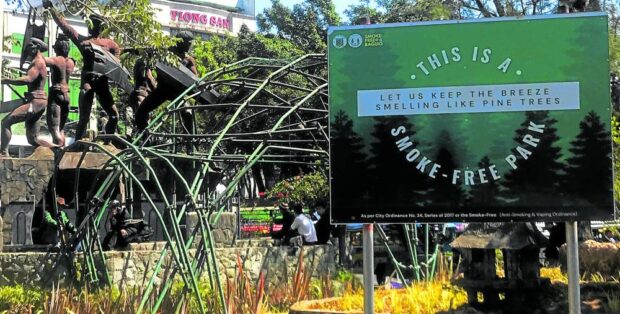Baguio sees drop in tobacco users amid strict anti-smoking law

SMELL THE PINE TREES, NOT CIGARETTES | Playing on Baguio City’s tourism brand, “Breathe Baguio,” campaign boards at public places like the Igorot Park urge residents and tourists to “keep the breeze smelling like pine trees” by not smoking. The number of cigarette smokers has declined in the city due in part to strict regulations that ban tobacco use in public places. (Photo by VINCENT CABREZA / Inquirer Northern Luzon)
BAGUIO CITY, Benguet, Philippines — This city’s strict antismoking program resulted in a sharp decline in the number of local tobacco consumers, which may allow the local government to impose a future “generational smoking ban” to prevent youths from accessing tobacco even when they reached legal age, according to experts at a health forum on Tuesday.
Organized by Health Justice Philippines and the Cordillera Regional Health Research and Development Consortium, the forum discussed the results of a study that evaluated the effectiveness of the smoke-free programs in Baguio and the vegetable-growing towns of La Trinidad and Buguias in Benguet province.
The study measured compliance with smoking restrictions inside government buildings, recreational space and transportation terminals, and Baguio displayed the “highest level of compliance,” according to Dr. Nelson Hora, the lead researcher.
It also showed that Baguio had the least exposure to “environmental tobacco smoke,” with only 10 percent exposure in work places, 7 percent in food establishments and 3 percent in public transports where smoking is banned.
The study also observed a “notable decrease in smokers” in Baguio, as well as the rest of the Cordillera region.
Article continues after this advertisementFor instance, the rate of daily tobacco smoking in Baguio dropped to a single digit (or about 9 percent) in 2022 from a peak of 31.8 percent in 2016 after Baguio began periodic adult tobacco consumption surveys in 2014, said city epidemiologist Dr. Donnabel Tubera-Panes, Hora’s fellow researcher, who cited parallel tobacco studies.
Article continues after this advertisement“A sustained single-digit rate of smokers means a community is ready to impose a generational ban,” Panes said.
Controversial
She was referring to a controversial antismoking policy that bars individuals who were born in a specific year from accessing, purchasing and using all forms of tobacco products in that locality.
New Zealand is historically the first country to impose a generational smoking ban on people born after 2008.
Passed in 2022 while New Zealand was led by Prime Minister Jacinda Ardern, it was allegedly withdrawn by her successor Christopher Luxon to prevent the rise of a “tobacco black market” because of the restrictions.
Malaysia also gained support for a Generation Endgame Bill that would have banned people born on or after January 1, 2007, from buying tobacco, but a “watered-down” version of the measure stalled at its parliament last year.
Balanga City in Bataan province enforced a “Tobacco Free Generation Ordinance” in 2016, which barred the sale of tobacco to people born after 2000, but its constitutionality has been challenged in court.
In Hora’s assessment study, La Trinidad also took top scores due to its no-smoking policy for indoor settings, its tobacco advertising restrictions and a prohibition on tobacco sales inside premises.